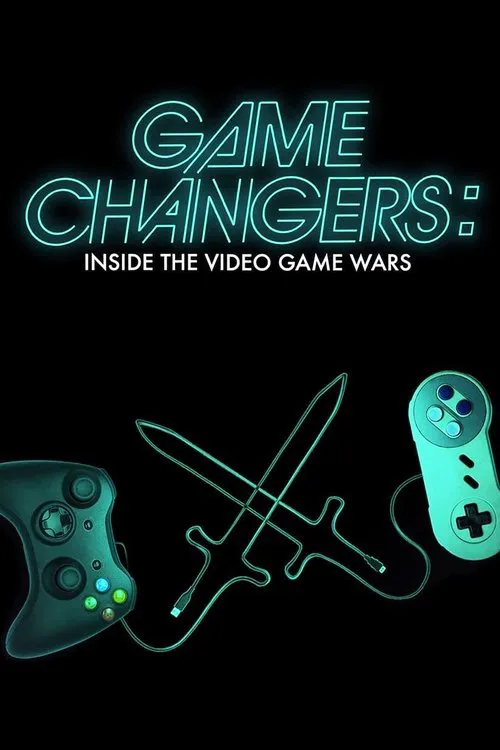Game Changers: Inside the Video Game Wars

あらすじ
In the vibrant landscape of the 1970s, a nascent industry was on the cusp of explosion, fueled by the creative genius and ambition of individuals who dared to challenge the status quo. The video game industry was born from a convergence of technical innovation and entrepreneurial spirit, as pioneers sought to harness the power of technology to transport people to new dimensions and ignite their imagination. This is the untold story of the personal battles that shaped the $100 billion video game industry, a 50-year epic that traversed multiple generations, marked by corporate intrigues, industrial espionage, and a quest for the ultimate prize. It all began with the rise of Atari, a pioneering company that revolutionized the industry with its arcade hits like Pong and Asteroids. Atari's success catapulted Atari's co-founder, Nolan Bushnell, to the forefront of the video game revolution. However, Bushnell's ambitions soon led him to depart from Atari, taking with him key talent, including his partner, Ted Dabney. The fallout between Bushnell and Atari's new management marked the beginning of a long-standing rivalry, one that would play out in boardrooms, courtrooms, and behind closed doors. As the 1980s dawned, a new player emerged in the shape of Sega, founded by the enigmatic Martin Bromely. Under the guidance of Bromely, Sega would go on to dominate the home console market with its revolutionary Sega Genesis console, but not before establishing a reputation for ruthless corporate tactics that earned it the enmity of many in the industry. Bromely's Sega would eventually clash with Nintendo, a company that, in the late 1980s, was on the verge of cementing its position as the industry leader with the Game Boy and the Nintendo Entertainment System (NES) console. Nintendo's founder, Hiroshi Yamauchi, a man of modest origins and immense vision, had overseen a transformation that propelled the company to unprecedented heights. Yamauchi's shrewd business acumen, combined with his ability to balance creative vision with commercial acumen, enabled Nintendo to corner the market on the NES console. However, with commercial success came the attention of Atari and their lawyers, who sought to take advantage of Nintendo's dominance. A patent and intellectual property lawsuit brought by Atari's lawyers would go on to shape the industry, forcing Nintendo to re-evaluate its approach to software licensing and hardware design. At the same time, the 1980s witnessed the rise of Electronic Arts (EA), a company founded by the visionaries Trip Hawkins and Mark Long. Under Hawkins' guidance, EA became a driving force in shaping the industry, pushing the boundaries of what was possible in terms of software engineering and creative design. EA's early successes, including the release of the seminal sports title, "Madden NFL," laid the groundwork for its future dominance of the market. The 1980s were also an era of corporate coups, marked by intense competition between companies as they jockeyed for market share and competitive advantage. A major turning point came with the release of Sony's PlayStation console, a machine that would go on to re-define the industry, as Sony successfully combined consumer electronics expertise with cutting-edge gaming capabilities. With the PlayStation came the rise of Sony's iconic figurehead, Jack Tretton, who would go on to lead the company's gaming division with unwavering commitment and creative vision. However, for every success story, there was a corresponding tale of loss and heartbreak. Sega, in its quest to recapture its dominance in the market, would go on to make fateful decisions that would eventually precipitate its downfall. The failure of the Dreamcast console, despite its innovative design and groundbreaking features, marked a significant turning point for the company. Sega's decision-making process, once renowned for its speed and agility, had become increasingly ham-fisted and out of touch, as the company clung to its failing business model. Throughout the decades, a dark underbelly of industrial espionage has been woven into the fabric of the video game industry. From the infamous 'copying' allegations leveled at Nintendo in the late 1980s to the high-profile lawsuits filed by Electronic Arts against a rival software company, this shadowy network of clandestine activities has cast a dubious aura over the industry. Yet, it is not just the cutthroat business dealings that have defined the gaming industry; rather, it has been the human side of the story that has given us the rich tapestry of experiences we enjoy today. Personal battles over patents and intellectual property, the struggles of creative visionaries in a cutthroat industry, and the triumphs of innovative entrepreneurs – these are just some of the stories that have woven the complex narrative of this billion-dollar industry. The pursuit of innovation has always been a delicate dance with failure. For each groundbreaking release, there were countless attempts that failed spectacularly, and the risk was ever-present that the next big gamble might end in ruin. The history of the gaming industry has been written in ink of triumph, tempered by the acid of regret and loss.
レビュー
おすすめ




